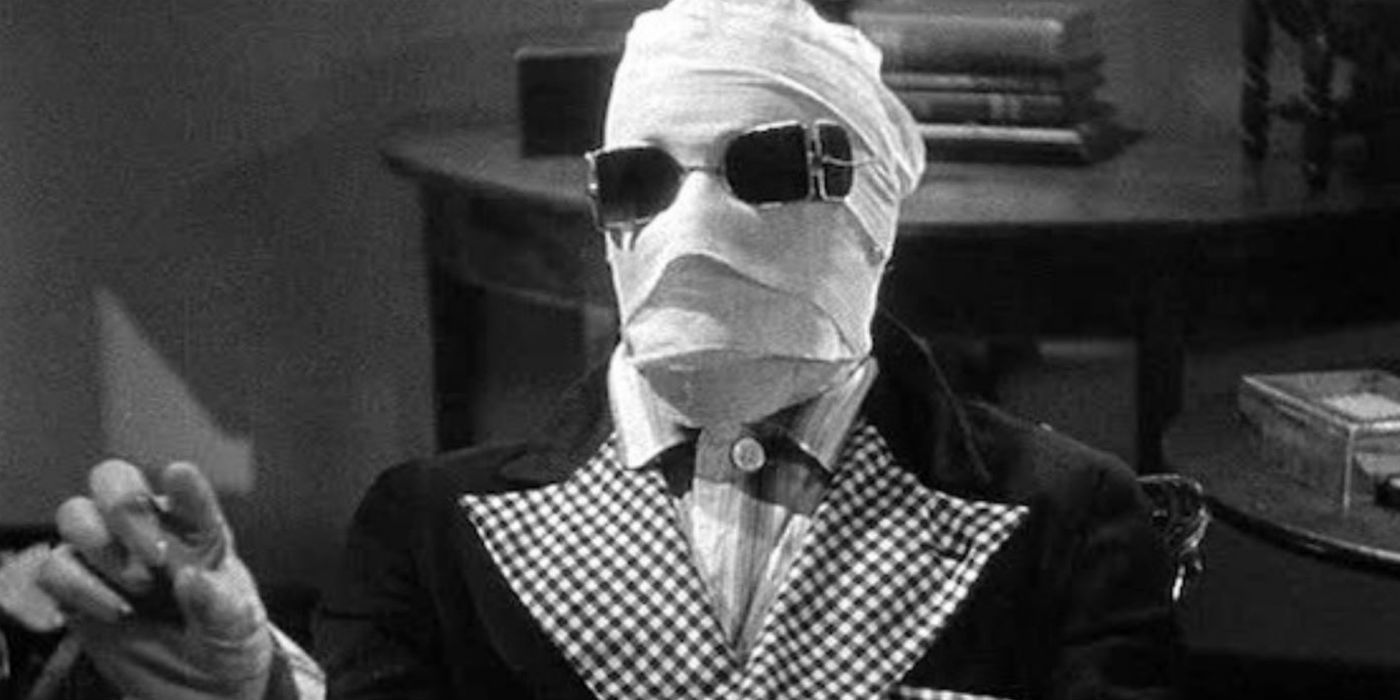Blumhouse's The Invisible Man 2020 is a great horror film, but it doesn't really have much in common with the 1933 Universal classic starring Claude Rains. When it comes to the Universal Studios classic monsters, The Invisible Man tends to kind of get the short shrift, possibly because he's not really a monster in the conventional sense. Sure, some of his actions are monstrous, but he's still just a mortal man at the end of the day, unlike Dracula, Frankenstein, the Mummy, or the Creature from the Black Lagoon.
Still, The Invisible Man is an entertaining villain, and his original 1933 movie was both a critical and commercial smash. Its success led to four sequels of varying quality, the most recent released way back in 1944, and the titular villain also met the comedy duo Abbott and Costello in a 1951 crossover outing. Regardless, the original remains a well-regarded film among the horror fans of today. The Invisible Man movie was of course based on the popular novel by legendary sci-fi author H.G. Wells, first published in 1897.
While The Invisible Man 1933 was a mostly faithful adaptation of Wells' book, it did make some notable changes. For one, the titular character was only called Griffin in the novel, while he's named Jack Griffin in the movie. The Griffin on the page is also a deranged villain before he even becomes invisible, while Jack in the film turns evil only due to the side effects of his invisibility serum. So in a way, The Invisible Man 2020 is just continuing an established tradition by making some notable changes to the 1933 film, albeit much bigger ones.
The Invisible Man Is Created By A Suit In 2020, Not A Serum
In The Invisible Man 1933, Jack Griffin (Claude Rains) is a chemist who stumbles onto an invisibility serum while experimenting with an untested substance called monocane. It's in fact the monocane part of his invisibility concoction that leads Jack to become increasingly more insane the longer he remains invisible. By contrast, Adrian Griffin (Oliver Jackson-Cohen) is a brilliant expert in the field of optics, and manages to invent a special suit capable of making the wearer invisible.
The science behind how exactly he accomplishes this feat isn't spelled out, but Adrian definitely takes a much different route to become invisible than did Jack in 1933. The fact that the invisibility comes from a suit also leads to the possibility that others besides Adrian can use it to also render themselves invisible. This is played with in the third act, which indeed sees other people don Adrian's suit and use it for their own purposes.
The Invisible Man Doesn't Go Mad With Invisibility
As mentioned previously, the 1933 Invisible Man movie sees Jack Griffin driven progressively more insane after using his serum to become invisible, thanks to the monocane chemical. Prior to injecting himself with the substance, Jack is shown to be a kind if overly ambitious man, and only even tries the monocane experiments to try and invent something major for his beloved, named Flora in the film. Jack may have ended up taking lives, and he gets his deserved comeuppance for doing so, but his motivations weren't that of a villain, however misguided they look when viewed through the lens of hindsight.
Conversely, Adrian was a controlling, abusive sociopath during his relationship with Cecilia (Elisabeth Moss), which finally led her to escape from his home with her sister. He in turn uses his special invisibility suit to stalk her and make her life hell, eventually framing her for murder, and leading everyone around her to think she's lost her mind. While Jack was a sympathetic villain to an extent, as his violent madness was accidental, Adrian experiences no adverse effects to becoming invisible, and is completely unrepentant about his evil deeds. Adrian may still be human, but he's far, far closer to a complete monster than Jack ever was.
The Invisible Man 2020 Is About Abuse, The Original... Is Not
It's been apparent since the first trailer that the real horror lurking behind The Invisible Man is that of domestic abuse. In the final film, this message is far from subtle, but considering how many people suffer domestic abuse in real life everyday, one could argue the horrific realities of those situations warrant hammering home. Cecilia exhibits telltale symptoms of PTSD, and after first leaving Adrian, can barely walk outside due to worries that he'll appear and recapture her, or do something even worse. Beyond the physical abuse, which he repeats while invisible, Cecilia tells her friends James and Sydney how Adrian had taken over every aspect of her life, influencing her every movement, thought, and action. It's also implied that he's sexually assaulted her as well, due to his desire to conceive a child, which she tries to avert by secretly using birth control pills. While things get worse once he turns invisible, Adrian had already been Cecilia's personal boogeyman long before that.
No such abuse themes are present in the 1933 Invisible Man film, because as mentioned, Jack was a nice person before becoming corrupted by his discovery. In fact, once he's become murderously unhinged, Jack still exhibits affection for Flora and protectiveness over her. After being shot by police, he even apologizes to her for his actions as he dies. That's a sharp contrast to Adrian, who while he claims to care for Cecilia, clearly sees her as his personal property more than anything else.
One assumes if he were to protect her, it would only be due to that feeling of ownership, not any genuine desire to keep her from harm. However, that creative choice actually works better for a horror story, as it's impossible to feel anything but empathy for Cecilia's plight, and anything but contempt for Adrian's willingness to hurt anyone necessary to get what he wants. By removing that element of remaining humanity, the dramatic stakes are raised, as at no point does the viewer question that Adrian won't exhibit any remorse or regret for what he's done.




